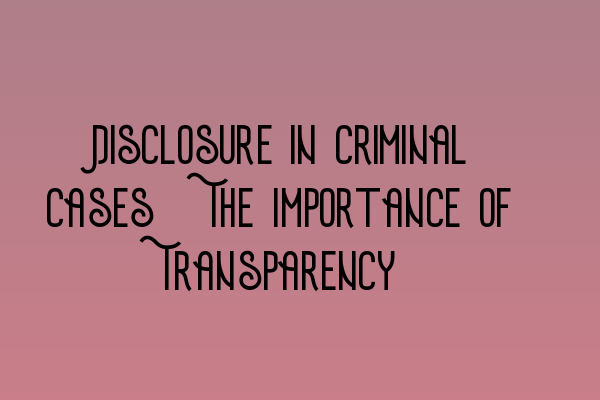Disclosure in Criminal Cases: The Importance of Transparency
In criminal cases, the disclosure process plays a crucial role in ensuring a fair trial. Disclosure refers to the exchange of information between the prosecution and the defense, where both parties provide relevant evidence to the other side. This process is a cornerstone of the criminal justice system, as it allows for transparency and prevents surprises in court.
The Significance of Disclosure
Transparency in criminal cases is paramount, as it ensures that all parties have access to the same information. This helps to create a level playing field, where the defense can adequately prepare their case and challenge the prosecution’s evidence. By disclosing all relevant information, the prosecution promotes a fair trial, upholding the principles of justice.
Without proper disclosure, the defense may be caught off guard or unable to effectively challenge the prosecution’s case. This not only jeopardizes the rights of the accused but also undermines public trust in the criminal justice system.
Challenges in the Disclosure Process
While disclosure is a fundamental aspect of criminal proceedings, challenges can arise during the process. Timeliness, volume, and relevance of information are some common hurdles encountered by both the prosecution and the defense.
Prosecutors must ensure that they disclose all relevant evidence promptly. Failing to do so may violate the defendant’s right to a fair trial. On the other hand, defense lawyers must carefully review and analyze the disclosed information to build a robust defense. This can be time-consuming, particularly in complex cases.
The Role of Technology in Disclosure
Advancements in technology have significantly impacted the disclosure process. Electronic disclosure platforms provide an efficient way of managing large volumes of information. These platforms allow for easier search and retrieval of digital documents, reducing the time required for review.
Furthermore, the use of technology in disclosure promotes transparency by ensuring that all relevant evidence is accessible to both parties. This helps minimize disputes regarding the adequacy of disclosure and ensures that all parties are on an equal footing.
Enhancing the Disclosure Process
To improve the disclosure process, it is essential for criminal justice practitioners to prioritize training and resources. Prosecutors and defense lawyers should receive adequate training on their disclosure obligations, emphasizing the importance of transparency.
Additionally, investing in technology and resources can aid in streamlining the disclosure process. Electronic disclosure platforms, like those offered by our SQE 1 Preparation Courses, can significantly enhance efficiency and promote transparency.
Conclusion
Disclosure in criminal cases is crucial for the fair administration of justice. Transparency ensures that all parties have access to the same information, enabling the defense to challenge the prosecution’s case effectively. While challenges in the disclosure process exist, technology and adequate training can help overcome these obstacles. At SQE Criminal Law & Practice Law UK, we emphasize the importance of transparency and offer SQE 1 Practice Exam Questions and SQE 1 Practice Mocks FLK1 FLK2 to aid in your preparation. For more information on our SQE 2 Preparation Courses and SRA SQE Exam Dates, please visit our website.
